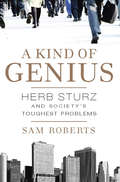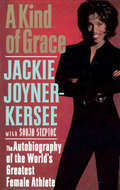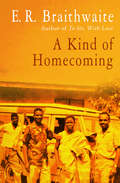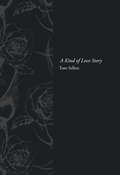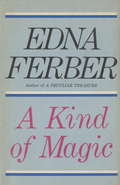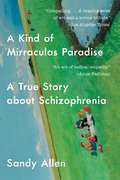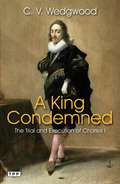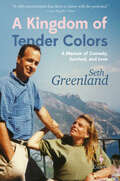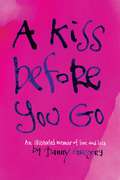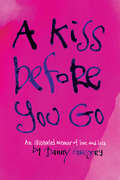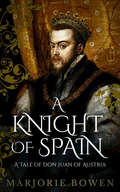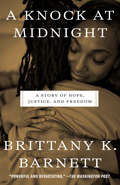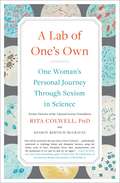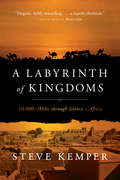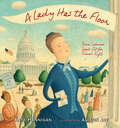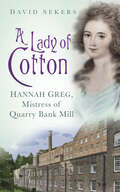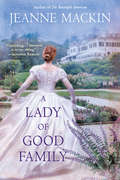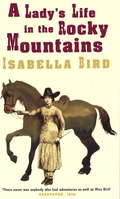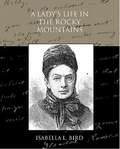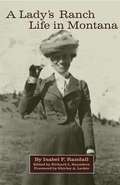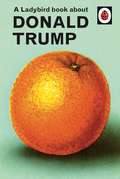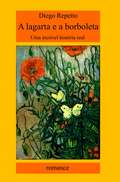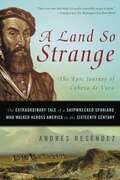- Table View
- List View
A Kind of Genius: Herb Sturz and Society's Toughest Problems
by Sam RobertsIn A Kind of Genius, Sam Roberts offers a window onto Herb Sturz's extraordinary life's work. Sturz began his long career in social entrepreneurship by reforming the bail system and founding the Vera Institute of Justice. He served as New York City's Deputy Mayor for Criminal Justice under Ed Koch and then as Chairman of the City Planning Commision. He moved on to establish affordable inner-city housing and programs for at-risk individuals. But Sturz has, to date, largely eschewed the public's eye.Roberts pays tribute to Sturz's inspirational legacy of accomplishment. His initiatives have consistently provided solutions to our most challenging problems. Here, for the first time, his astonishing story is told in full.
A Kind of Grace: The Autobiography of the World's Greatest Female Athlete
by Jackie Joyner-KerseeJackie Joyner-Kersee is one of the world's most successful athletes, and has dominated the women's decathlon for many years. With this book, Jackie discusses how she has overcome her difficult early years to rise to the top.
A Kind of Homecoming: Honorary White, Reluctant Neighbors, And A Kind Of Homecoming
by E. R. BraithwaiteFrom the bestselling author of To Sir, With Love comes the moving personal memoir of a westernized black man who journeys to Africa in search of his roots and discovers a vibrant and extraordinary society on the verge of monumental changeIn the early 1960s acclaimed British Guianese author E. R. Braithwaite embarked on a pilgrimage to the West African countries of Ghana, Guinea, Liberia, and across Sierra Leone just as the emerging nation was preparing to declare its independence. What Braithwaite discovered was a world vastly different from the staid, firmly established British society in which he had spent most of his life. In a place as foreign to him as the dark side of the moon, he was overcome by colorful sights, sounds, and smells that vividly reawakened lost memories from his childhood. Entering the intimate circles of the local intelligentsia, Braithwaite was able to view these newly evolving African societies from the inside, struck by their mixtures of passion and naïveté, their political obsessions and technological indifference. The author discovered a world that fascinated, excited, and, in some cases, deeply troubled him—and in the process he discovered himself.E. R. Braithwaite&’s A Kind of Homecoming is at once an enthralling personal journey and an eye-opening chronicle of a time of great change on the African continent that helps us to better understand the West Africa of today.
A Kind of Love Story
by Tom SellersTom Sellers is a luminary of the British culinary scene. His Restaurant Story opened its doors in April 2013; its innovative literary-inspired menu, taking diners on 'a personal journey through food', has won him huge critical and public acclaim. Story was awarded its first Michelin star just five months after opening. This stunning book will be your chance to enter the visionary mind of one of the most original chefs of our time, and discover the truth behind the tales of his brilliant food.
A Kind of Love Story
by Tom SellersThe story behind life in a world-renown Michelin-starred restaurant.Tom Sellers is a luminary of the British culinary scene. His Restaurant Story opened its doors in April 2013; its innovative literary-inspired menu, taking diners on 'a personal journey through food', has won him huge critical and public acclaim. Story was awarded its first Michelin star just five months after opening. This stunning book will be your chance to enter the visionary mind of one of the most original chefs of our time, and discover the truth behind the tales of his brilliant food.
A Kind of Magic
by Edna FerberBestselling author and Pulitzer Prize winner Edna Ferber's fascinating second autobiography--a follow-up to her first, A Peculiar Treasure--in which she shares the adventures of her life from 1939 to 1963.Rather than just an autobiography, A Kind of Magic serves as a chronicle of American history from 1939-1963 through the eyes of a highly skilled and sensitive observer. A fan of the fine arts, Ferber offers intimate glimpses into the personalities of performers from James Dean to George S. Kaufman, and goes on to share her uncanny knack for having been consistently where the news of the day was breaking. She was in Washington the day President Roosevelt died, in London when the 8th Air Force launched its first long-range daylight raids, at Buchenwald and Nordhausen shortly after their liberation, and--more happily--in Paris on V.E. Day and in New York on V.J. Day. In these pages she recaptures that black-and-white insanity of that war and all wars, as well as the stifling, post-war complecency which gripped America at the time.
A Kind of Mirraculas Paradise: A True Story About Schizophrenia
by Sandra AllenDazzlingly, daringly written, marrying the thoughtful originality of Maggie Nelson's The Argonauts with the revelatory power of Neurotribes and The Spirit Catches You and You Fall Down, this propulsive, stunning book illuminates the experience of living with schizophrenia like never before.Sandra Allen did not know her uncle Bob very well. As a child, she had been told he was “crazy,” that he had spent time in mental hospitals while growing up in Berkeley in the 60s and 70s. But Bob had lived a hermetic life in a remote part of California for longer than she had been alive, and what little she knew of him came from rare family reunions or odd, infrequent phone calls. Then in 2009 Bob mailed her his autobiography. Typewritten in all caps, a stream of error-riddled sentences over sixty, single-spaced pages, the often incomprehensible manuscript proclaimed to be a “true story” about being “labeled a psychotic paranoid schizophrenic,” and arrived with a plea to help him get his story out to the world. In A Kind of Mirraculas Paradise, Allen translates her uncle’s autobiography, artfully creating a gripping coming-of-age story while sticking faithfully to the facts as he shared them. Lacing Bob’s narrative with chapters providing greater contextualization, Allen also shares background information about her family, the culturally explosive time and place of her uncle’s formative years, and the vitally important questions surrounding schizophrenia and mental healthcare in America more broadly. The result is a heartbreaking and sometimes hilarious portrait of a young man striving for stability in his life as well as his mind, and an utterly unique lens into an experience that, to most people, remains unimaginable.
A King Condemned: The Trial And Execution Of Charles I
by C. V. Wedgwood Clive HolmesThe reign of Charles I, defined by religious conflict, a titanic power struggle with Parliament, and culminating in the English Civil Wars, the execution of the king, and the brief abolition of the monarchy, was one of the most turbulent in English history. Six years after the First Civil War began, and following Charles' support for the failed Royalist uprising of the Second Civil War, an act of Parliament was passed that produced something unprecedented in the history of England: the trial of an English king on a capital charge. There followed ten extraordinary weeks that finally drew to a dark end on January 30, 1649, when Charles was beheaded in Whitehall. In this acclaimed account, C. V. Wedgwood recreates the dramatic events of the trial and Charles' final days to bring vividly to life the main actors in this tragic and compelling story
A Kingdom of Tender Colors: A Memoir of Comedy, Survival, and Love
by Seth GreenlandA young Hollywood screenwriter faces lymphatic cancer in this witty memoir.One unremarkable day at the age of thirty-seven, Seth Greenland finds himself in everyone’s nightmare: a routine doctor visit, some swollen glands, a series of tests, a biopsy, and finally a diagnosis of an aggressive form of lymphatic cancer. A screenwriter and satirist with a blooming career in Hollywood, Seth has felt pretty good about his life until now; suddenly, the world has tipped on its axis.With the support of friends and family, Seth launches into an attempt to save his own life without losing either his sanity or his sense of humor. From chemotherapy treatments, to meditation and more alternative treatments, he battles the disease with wit, honesty, and no small amount of sheer terror. There are no pat answers or inspirational revelations here, just one man confronting hopes and fears recognizable to us all—and triumphing.Praise for A Kingdom of Tender Colors“Intelligent, self-aware, and resistant to easy answers, A Kingdom of Tender Colors defies any expectation of being a cancer survival guide. Instead, more radically, it is a book about finding a way of being. It is existential in the way of Camus’s The Stranger, without the murder and with more jokes.” —Tom Teicholz, Los Angeles Review of Books“[Greenland] provides genial, engaging, humorous company throughout the narrative, showing how one can gain a new appreciation for life at its most mundane as well as miraculous.” —Kirkus Reviews“Absorbing and funny . . . Readers may come for the screenwriter/novelist’s cancer story, but they’ll stay for his gifts as a raconteur.” —Shelf Awareness“A Kingdom of Tender Colors brings a charming humor to a subject that is nothing if not dire. . . . Greenland holds nothing back, including his feelings of inadequacy and incredulity.” —Alta Journal
A Kingston Album: Glimpses of the Way We Were
by Marion Van de WeteringThis album follows the history of Kingston from the founding of Fort Frontenac and the accompanying French settlement of Cataraqui in 1673 to its present-day incarnation as a popular tourist and travel destination. In addition to its fine military tradition, Kingston has also been the centre of commerce, shipping, industry, education, and government in the region. Many local citizens have prospered greatly from these diverse endeavours. Others have been less fortunate. From the boom times of Dilene Dexter Calvin’s huge shipping industry and James Richardson’s grain enterprise to the corruption and cruelty of Kingston Penetentiary under Warden Henry Smith Sr., the ups and downs of Kingston’s citizens have mirrored the city’s own. As Kingston’s importance grew, so too did the influence its inhabitants had during the last days of the unified colony and the first of the fledgling Dominion. Sir John Graves Simcoe made Kingston his home for a time, as did Lord Sydenham and Sir John A. Macdonald. More than one hundred black-and-white photographs accompany the text, granting an intimate look at all facets of life in Kingston over the last century. From the prisoners’ quarters at Fort Henry during World War I and the fire in City Hall, to the bustle of market square at the turn of the century and the lonely stretch of road which was Division Street, these photos display both the momentous occasions in the city’s history and the mundane. Hand-picked from the collections of the National Archives of Canada, the Archives of Ontario, and Queen’s University Archives, these beautiful photographs capture the pride and the pain of a city constantly in transition.
A Kiss Before You Go
by Danny GregoryAfter the loss of his wife in a tragic accident, beloved artist Danny Gregory chronicled his grief in the medium he knows best--the pages of his illustrated journals. This intimate reproduction of his journal is a stirring visual memoir of Gregory's journey towards recovery. Uniquely sincere, and by turns tender, raw, and hopeful, Gregory's idiosyncratic text and illustrations capture the darkest and lightest moments of his "year of magical drawing." Gregory's process reminds us that creative expression offers its own therapy, and that living each day to its fullest may be as simple as putting pen to paper. Anyone who has experienced loss will take solace in this refreshingly candid look at grieving, while art lovers will marvel at the artist's beautiful celebration of the power of creation.
A Kiss Before You Go: An Illustrated Memoir of Love and Loss
by Danny GregoryAfter the loss of his wife in a tragic accident, beloved artist Danny Gregory chronicled his grief in the medium he knows best—the pages of his illustrated journals. This intimate reproduction of his journal is a stirring visual memoir of Gregory's journey towards recovery. Uniquely sincere, and by turns tender, raw, and hopeful, Gregory's idiosyncratic text and illustrations capture the darkest and lightest moments of his "year of magical drawing." Gregory's process reminds us that creative expression offers its own therapy, and that living each day to its fullest may be as simple as putting pen to paper. Anyone who has experienced loss will take solace in this refreshingly candid look at grieving, while art lovers will marvel at the artist's beautiful celebration of the power of creation.
A Knight of Spain: A Tale of Don Juan of Austria
by Marjorie BowenFrom the author of God and the Wedding Dress: An engaging historical novel of romance and intrigue based on the life of Don Juan of Austria. On a midsummer day, storm clouds form over Alcalà as three young princes decide who will earn the attentions of the beautiful Doña Aña Santofimia . . . While Don Carlos, the prince of Spain, wins the chance, it is the king’s illegitimate brother—Don Juan—who later wins the lady’s heart. But ambition, religious wars, and the machinations of the royal family divide the young lovers. Don Juan must take his own fate in hand to protect those he loves, and Spain itself, amid the deep divisions that threaten to destroy it all . . . Praise for Marjorie Bowen “Miss Bowen’s work is of the exceptional class.” —The Scotsman on Mary Queen of Scots
A Knock at Midnight: A Story of Hope, Justice, and Freedom
by Brittany K. BarnettAn urgent call to free those buried alive by America&’s legal system, and an inspiring true story about unwavering belief in humanity—from a gifted young lawyer and important new voice in the movement to transform the system.NAMED ONE OF THE BEST BOOKS OF THE SUMMER BY USA TODAY AND NEWSWEEK • &“An essential book for our time . . . Brittany K. Barnett is a star.&”—Van Jones, CEO of REFORM Alliance, CNN Host, and New York Times bestselling author Brittany K. Barnett was only a law student when she came across the case that would change her life forever—that of Sharanda Jones, single mother, business owner, and, like Brittany, Black daughter of the rural South. A victim of America&’s devastating war on drugs, Sharanda had been torn away from her young daughter and was serving a life sentence without parole—for a first-time drug offense. In Sharanda, Brittany saw haunting echoes of her own life, both as the daughter of a formerly incarcerated mother and as the once-girlfriend of an abusive drug dealer. As she studied this case, a system came into focus: one where widespread racial injustice forms the core of America&’s addiction to incarceration. Moved by Sharanda&’s plight, Brittany set to work to gain her freedom. This had never been the plan. Bright and ambitious, Brittany was a successful accountant on her way to a high-powered future in corporate law. But Sharanda&’s case opened the door to a harrowing journey through the criminal justice system. By day she moved billion-dollar deals, and by night she worked pro bono to free clients in near-hopeless legal battles. Ultimately, her path transformed her understanding of injustice in the courts, of genius languishing behind bars, and the very definition of freedom itself.Brittany&’s riveting memoir is at once a coming-of-age story and a powerful evocation of what it takes to bring hope and justice to a system built to resist them both.
A Lab of One's Own: One Woman's Personal Journey Through Sexism in Science
by Rita Colwell Sharon Bertsch McGrayneA riveting memoir-manifesto from the first female director of the National Science Foundation about the entrenched sexism in science, the elaborate detours women have taken to bypass the problem, and how to fix the system. If you think sexism thrives only on Wall Street or in Hollywood, you haven&’t visited a lab, a science department, a research foundation, or a biotech firm. Rita Colwell is one of the top scientists in America: the groundbreaking microbiologist who discovered how cholera survives between epidemics and the former head of the National Science Foundation. But when she first applied for a graduate fellowship in bacteriology, she was told, &“We don&’t waste fellowships on women.&” A lack of support from some male superiors would lead her to change her area of study six times before completing her PhD. A Lab of One&’s Own documents all Colwell has seen and heard over her six decades in science, from sexual harassment in the lab to obscure systems blocking women from leading professional organizations or publishing their work. Along the way, she encounters other women pushing back against the status quo, including a group at MIT who revolt when they discover their labs are a fraction of the size of their male colleagues&’. Resistance gave female scientists special gifts: forced to change specialties so many times, they came to see things in a more interdisciplinary way, which turned out to be key to making new discoveries in the twentieth and twenty-first centuries. Colwell would also witness the advances that could be made when men and women worked together—often under her direction, such as when she headed a team that helped to uncover the source of the anthrax used in the 2001 letter attacks. A Lab of One&’s Own shares the sheer joy a scientist feels when moving toward a breakthrough, and the thrill of uncovering a whole new generation of female pioneers. But it is also the science book for the #MeToo era, offering an astute diagnosis of how to fix the problem of sexism in science—and a celebration of the women pushing back.
A Labyrinth of Kingdoms: 10,000 Miles through Islamic Africa
by Steve KemperA true story that rivals the travels of Burton or Stanley for excitement, and surpasses them in scientific achievements. In 1849 Heinrich Barth joined a small British expedition into unexplored regions of Islamic North and Central Africa. One by one his companions died, but he carried on alone, eventually reaching the fabled city of gold, Timbuktu. His five-and-a-half-year, 10,000-mile adventure ranks among the greatest journeys in the annals of exploration, and his discoveries are considered indispensable by modern scholars of Africa. Yet because of shifting politics, European preconceptions about Africa, and his own thorny personality, Barth has been almost forgotten. The general public has never heard of him, his epic journey, or his still-pertinent observations about Africa and Islam; and his monumental five-volume Travels and Discoveries in North and Central Africa is rare even in libraries. By delivering the first biography on Barth in English, Steve Kemper goes a long way to rescue this fascinating figure from obscurity.
A Lady Has the Floor: Belva Lockwood Speaks Out for Women's Rights
by Kate HanniganWritten in the same vein as the recent best-selling titles I DISSENT and SHE PERSISTED, here is a nonfiction picture book biography of Belva Lockwood, a lawyer, activist and presidential candidate who devoted her life to overcoming obstacles and demanding equality for women.Activist Belva Lockwood never stopped asking herself the question Are women not worth the same as men? She had big dreams and didn't let anyone stand in her way--not her father, her law school, or even the U.S. Supreme Court. She fought for equality for women in the classroom, in the courtroom, and in politics. In her quest for fairness and parity, Lockwood ran for President of the United States, becoming the first woman on the ballot. In this riveting nonfiction picture book biography, award-winning author Kate Hannigan and celebrated artist Alison Jay illuminate the life of Lockwood, a woman who was never afraid to take the floor and speak her mind.
A Lady of Cotton: Hannah Greg, Mistress of Quarry Bank Mill
by David SekersIn 1789 Hannah Lightbody, a well-educated and intelligent young woman of means, married Samuel Greg and found herself at the centre of his cotton empire in the industrial heart of England. It was a man’s world, in which women like Hannah were barred from politics, had few rights and were expected to be little more than good, dutiful wives. Struggling to apply herself to household management, Hannah instead turned her attention to the well-being of the cotton mill workers under her husband’s control. Over the next four decades she fought to improve the education, health and welfare of cotton girls and pauper apprentices at the mill. Her legacy helped turn the north-west into the pioneering heart of reform in Britain. Here, the story of Hannah’s remarkable life is told for the first time.
A Lady of Good Family
by Jeanne MackinFrom the author of The Beautiful American comes a richly imagined, beautifully written novel about historical figure Beatrix Farrand, one of the first female landscape architects. Raised among wealth and privilege during America's fabled Gilded Age, a niece of famous novelist Edith Wharton and a friend to literary great Henry James, Beatrix Farrand is expected to marry, and marry well. But as a young woman traveling through Europe with her mother and aunt, she already knows that gardens are her true passion. How this highborn woman with unconventional views escapes the dictates of society to become the most celebrated female landscape designer in the country is the story of her unique determination to create beauty and serenity while remaining true to herself. Beatrix's journey begins at the age of twenty-three in the Borghese Gardens of Rome, where she meets beguiling Amerigo Massimo, an Italian gentleman of sensitivity and charm--a man unlike any she has known before....
A Lady's Life In The Rocky Mountains (Virago classic non-fiction)
by Isabella L. BirdBorn in 1831, Isabella, daughter of a clergyman, set off alone to the Antipodes in 1872 'in search of health' and found she had embarked on a life of adventurous travel. In 1873, wearing Hawaiian riding dress, she rode on her spirited horse Birdie through the American 'Wild West', a terrain only recently opened to pioneer settlement. Here she met Rocky Mountain Jim, her 'dear (one-eyed) desperado', fond of poetry and whisky - 'a man any women might love, but no sane woman would marry'. He helped her climb the 'American Matterhorn' and round up cattle on horseback.The wonderful letters which make up this volume were first published in 1879 and were enormously popular in Isabella Bird's lifetime. They tell of magnificent unspoilt landscapes and abundant wildlife, of small remote townships, of her encounters with rattlesnakes, wolves, pumas and grizzly bears and her reactions to the volatile passions of the miners and pioneer settlers.
A Lady's Life in the Rocky Mountains
by Isabella L. BirdIsabella L Bird (1831 - 1904) was a 19th century British traveler and writer. Since her father was a Church of England priest the family moved many times during her childhood. Bird traveled to Colorado when she heard the air was very healthy. She covered the 800 miles on horseback riding like a man and not sidesaddle. During her adventure she wrote a series of letters home to her sister. These were published in the Leisure Hour magazine. The letters were later published in her most famous book A Lady's Life in the Rocky Mountains.
A Lady's Ranch Life in Montana
by Isabel F. Randall"A faithful and unvarnished Record of a Settler's Life" is how Isabel Randall described her letters when they were first published in 1887. Many foreign travelers published accounts of their visits to the American West, but Randall was one of the few European women to write about the western experience from the inside. In 1884 Randall and her husband settled on a ranch in Montana hoping to make their fortune in the livestock boom. Randall's letters home to England describe the practical affairs of daily life, rural social interactions, and the natural world around her. Her letters are cheerful, but they also suggest why the Randalls ultimately failed to achieve financial success. In this new edition of A Lady's Ranch Life in Montana, Richard L. Saunders supplements Randall's letters with notes and an extensive introduction drawn from a wealth of primary sources. He sketches the Randalls' lives before and after their western adventure, describes the stock industry that drew them to Montana, places Isabel's letters in the context of English attitudes toward Americans, and discusses her neighbors' reactions to her criticisms of local society.
A Ladybird Book About Donald Trump (Ladybirds for Grown-Ups)
by Joel Morris Jason HazeleyAs we prepare to wave the President out of the White House, commemorate the past four years with this charming introduction to his very important life and his many, many friends - the perfect stocking filler this Christmas._________'When Donald won the election, he did not believe it."This election was a bad, unfair election," said Donald, about the election that he won.One day, Donald might lose an election. He will not like that election at all.And when Donald is told it is time to stop being the President, who knows what exciting things will happen next?'_________'Anyone can grow up to become the President.Or they can become President first and think about growing up later.'_________This delightful book is the latest in the series of Ladybird books which have been specially planned to help grown-ups with the world about them.Something the President himself could do with.The large clear script, the careful choice of words, the frequent repetition and the thoughtful matching of text with pictures all enable grown-ups to think they have taught themselves to cope.Featuring original Ladybird artwork alongside brilliantly funny, brand new text.Praise for The Story of Brexit:'Hilarious' Stylist'One of the Best Comedy Books of 2018' The List'The latest offering in the hilarious Ladybird for Grown Ups series is a funny mickey-take of the Brexit debate (and boy, do we need some fun)' Sunday Post
A Lagarta e a Borboleta
by Diego RepettoDescrição do Livro “Quem está lá fora não nota. O ritmo da vida deles é absorvido com seus próprios problemas, não com os nossos. O trabalho, a família e o resto. Um ritmo frenético, uma corrida de tirar o fôlego, sem um instante sequer para respirar. Para eles, falta tempo, para nós sobra... tudo muda do lado de lá destes muros. Aqui, ao contrário, tudo permanece igual, cristalizado. Somos as lagartas que jamais serão borboletas”. Neste mundo, são sempre os mais frágeis a pagar o preço mais alto. São os que não podem voar que são pegos todas as vezes como bode expiatório. E não voam, não porque não querem, mas porque algo, ou alguém mais poderoso lhe partiu as asas. Guido se vê menino com uma mãe para procurar e um pai para vingar. Alguns anos depois, pouco mais que um adolescente, decide acertar contas com um passado cujo peso se fez sentir, com o decorrer do tempo, insuportável. Uma decisão que o fará descobrir muitos lados obscuros de sua família e que marcará para sempre o resto da sua vida.
A Land So Strange: The Epic Journey of Cabeza de Vaca
by ResendezIn 1528, a mission set out from Spain to colonize Florida. But the expedition went horribly wrong: Delayed by a hurricane, knocked off course by a colossal error of navigation, and ultimately doomed by a disastrous decision to separate the men from their ships, the mission quickly became a desperate journey of survival. Of the three hundred men who had embarked on the journey, only four survived--three Spaniards and an African slave. This tiny band endured a horrific march through Florida, a harrowing raft passage across the Louisiana coast, and years of enslavement in the American Southwest. They journeyed for almost ten years in search of the Pacific Ocean that would guide them home, and they were forever changed by their experience. The men lived with a variety of nomadic Indians and learned several indigenous languages. They saw lands, peoples, plants, and animals that no outsider had ever seen before. In this enthralling tale of four castaways wandering in an unknown land, Andrés Reséndez brings to life the vast, dynamic world of North America just a few years before European settlers would transform it forever.
